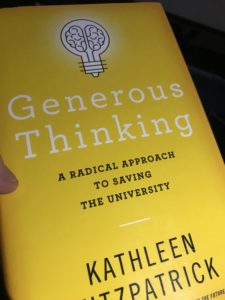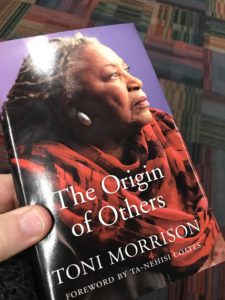
[I started writing this post with the MLA embers still hot, but then got swept away from it in the maelstrom and deep freeze of early Jan. Not all of what I wanted to say is recoverable — but some of it is here.]
Home again! In post-MLA afterglow, in which I have lots of work to do before the spring semester launches, but it’s also clearly a day to take the puppy on a long walk into the salt marsh, to make dinner for the family, and maybe to sketch out a blog post. Catch those sparks before they fade!
The older I get the less traumatic MLA becomes, which almost certainly says more about my own obliviousness than about the conference itself. The MLA conference feels to be in a kind of transition, at least to me — the rise of Skype interviews is somewhat displacing its former centrality, for the better certainly. Last year when the MLA was in tornado-snowed New York, lots of our SJU grad students were around, and we even hosted the only MLA cash bar my University has ever (and will ever, I’m sure) paid for. My past weekend in Chicago was mostly the oldsters, except for one great blue humanities panel in early American studies chaired by Marty Rojas.
Flying Delta’s steel birds home via Detroit back to CT I wolfed down two morsels that I’d picked up at the Book Exhibit: Toni Morrison’s The Origin of Others, and Kathleen Fitzpatrick’s Generous Thinking. They concentrated my mind, as books do, and I’m going to use them to think through #mla19.
Fitzpatrick’s book, subtitled A Radical Approach to Saving the University, argues that a turn away from competition for prestige and into more generous kinds of “conversational practice” (56) can strengthen the humanities in our time of struggle. I like her suggestions and mantras, from support for open-access publishing to the somewhat more radical open peer review. I also like the ideas of “working in public” (135) and “giving it away” (152), which basically amount to a conception of academic labor that’s not about hoarding precious knowledge but managing flows of information. She writes well about the contrast between inquiry (good!) and mastery (not always good!), about conversation as a scholarly value, and — in my favorite part of the book — about Simone Weil’s more or less theological understanding of attention as the “rarest and purest form of generosity” (46):

Attention requires letting go of the self, relinquishing will, and finding instead a position of radical receptivity that creates the ground for learning, for connection. (76)
There are things about attention, perhaps especially in the context of MLA, that feel more aggressive that Fitzpatrick’s Weil-inflected description. But attention’s insistent tug also defined the best parts of #mla19 for me. Maybe attention is both what we give each other and what we give texts — attention as a pressure and receptivity that re-contextualizes, brings something forward into new view, that startles and reimagines.
Like her brilliant and searing short New Yorker piece in the aftermath of the November 2016 election, Origin combines insight, anger, and ice-eyed clarity.
Morrison’s Origin of Others, drawn from her 2015 Charles Eliot Norton lectures at Harvard, commands the attention her brilliant career has earned. Reading it brought me back to the one time I’ve heard her speak in public, in an overcrowded lecture hall in Princeton around 1988, when she dazzled us by exfoliating the opening lines of each of her novels. Her Norton lectures explore the perverse imaginative leaps required by slavery and Other-creation. It made me want to re-read the novels, starting again not with my favorite (Song of Solomon) but with Paradise, which I’m not sure I fully grasped when I read it back in 1998.
[That’s as far as I got on the other end of this month. With more time I might have more to say about Fitzpatrick’s inspiring book, and Morrison’s gorgeous and troubling vision. But I think I’ll post now, with what I have: the generosity that Fitzpatrick conjures, the rage Morrison projects, the imagination that links both to the best parts of academic life.]

Next, I’ll probably have some things to say about the spring 2019 semester!